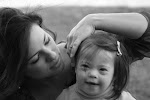
The GOLDEN ADVOCATE AWARD is given to bloggers who have gone above and beyond to educate and advocate for people who have special needs.
I recently received The Golden Advocate Award from the very awesome ds.mama (and she's not just awesome because she gave me the award!). Go here to read the very nice things she said about me and to see how her blog is helping to demystify Down syndrome (and parenting a child with Ds) while providing a welcoming and educational place for parents with a new diagnosis.
Like many other Golden Advocate recipients, I can think of a handful of other bloggers who are more than deserving of this honor. I love how the content and personality of each blog is unique to the blog owner/family. There are so many people doing great things for our kids. There's a little something for everyone out here in blogland!
There are the obvious: Jennifer Graf Groneberg, Kathryn Soper and Patricia Bauer. Each of these women are large-scale, public advocates for people with disabilities doing important and meaningful work for our children, and for all of us.
There are two other people--who may be lesser known on a national scale, and who I am nominating for this honor--who jump out in my mind as going "above and beyond" to educate and inspire--to get the word out that the time is right to take the reigns and make our own way toward opening doors for all of our children. (Our children are opening doors for themselves, too.)
My previous post touches barely the tip of the iceberg as to what Jennifer from Three's a Charm is doing to push the cause forward. Her "i did it" campaign is just one example of Jen's creativity and advocacy efforts. I'm also nominating Jen for her willingness to share her experiences in an incredibly honest way, and for her clear desire to help others understand the "up side" of Down syndrome. She makes a point throughout her blog to make mention of the potential that people with Ds possess, and of the many gifts they bring to the world.
From making homemade baby food for her son, Joaquin (and otherwise providing her entire family a wholesome diet), to collaborating with The Institutes to assist Joaquin's development, she is giving her son(s) every opportunity to live a full, happy and healthy life. Thank you, Jennifer, for all you do!
I'm also nominating Lito of The Accidental Advocate for his sharp analytical skills, vision and dedication to making things better for people with disabilities. Lito believes "that the status quo is just not good enough, and that there is something more, something better ahead for our children living with Down syndrome".
We all benefit from his interests in research and legislation which impact the Ds population, education, health care, parenting, and other issues and trends affecting people with disabilities and their families.
In addition to managing his blog, Lito has also recently founded The Central Ohio Down Syndrome Society (CODSS), which is already becoming an incredibly important organization for us locally and is positioned to have an even wider impact and significance with it's clearly defined vision and missions. Follow the above link for an overview of the leading-edge research and clinical trials that CODSS is backing, as well as to learn more about this new, forward-thinking organization. Thank you, Lito, for your hard work and dedication!
Visit Rejenerations, home of the Golden Advocate Award, to learn specifics about accepting this award and passing it along.
Stay tuned for more discussion on Disability is Natural.













